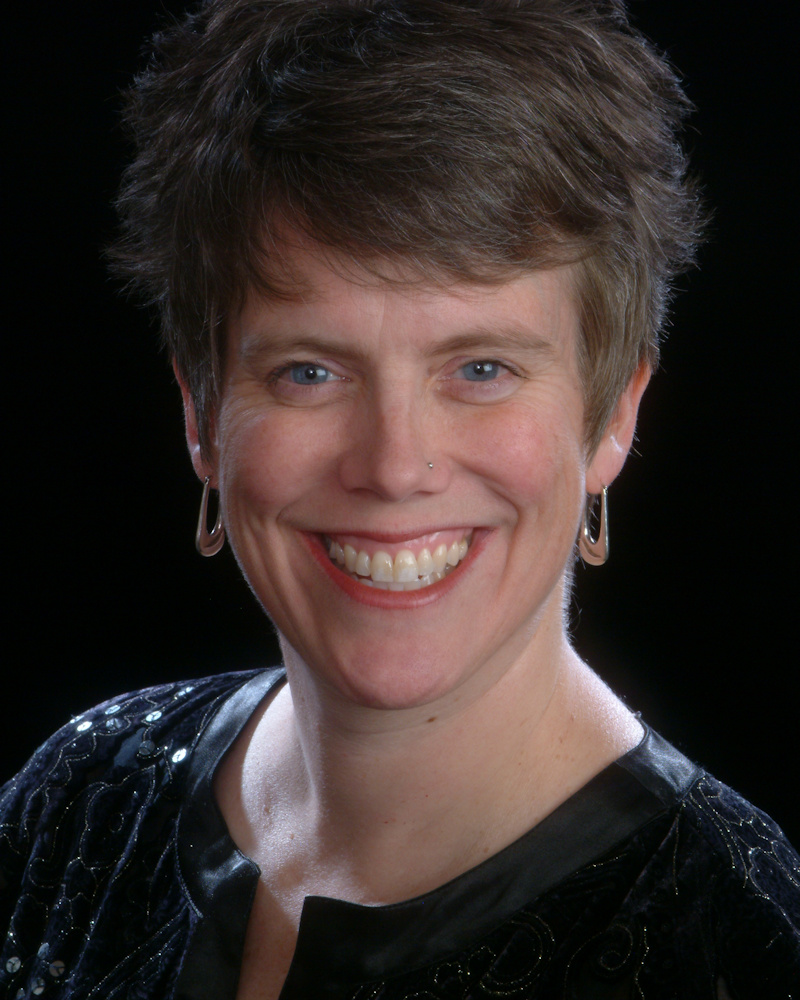
Rev. Rebecca Voelkel
Biography
Rebecca Mary MacKenzie Voelkel was born in 1969 into a very Protestant and very politically-active family. At the time, her father, William R. Voelkel (Bill) was a United Church of Christ minister (the sixteenth generation in his family) doing community-organizing training. Her mother, Marguerite Unwin Voelkel, would later attend seminary and go on to serve several inner-city congregations. Her grandmother, Mary Doyle MacKenzie Unwin, a Scottish immigrant, was a very active laywoman in the Presbyterian Church as well as a leader in local labor and elder rights causes.
At the age of three, on the bus with her “grammie” in Cleveland, Rebecca pointed out all the churches by name as they rode downtown—having attended some labor, elder rights or church meeting at all of them. She didn’t eat a grape until she was well into her teenage years because her parents supported the United Farm Workers’ boycott. By high school she had served as a delegate to the General Synod of the United Church of Christ. While for some this might have been cause for rebellion, for Rebecca it embedded in her marrow the lesson that faith must always be embodied in the practice of justice.
So it wasn’t a surprise when, at eighteen, she went to El Salvador with the Chicago Religious Task Force on Central America. Although already a practicing Christian and active in justice work, she experienced a “coming to faith” while visiting with the Co-Madres (Mothers of the Disappeared). When she asked one of the Co-Madres how it was that she survived and was able to continue protesting the violence, the woman replied, “I have lost five of my children to this civil war. One of them, my oldest son, I witnessed being tortured to death. I have been able to survive because I know that in Jesus Christ, God knows in [God’s] body what it means to be tortured to death. So my son did not die alone, but being held in God’s arms. And in the resurrection, God has said, once and for all, that life and love are stronger than death. So, it doesn’t matter what they try to do to me. Even if they kill me, I know that God will resurrect me. And that makes me powerful.”
For Rebecca, at age eighteen, this experience was life-changing and formed another of her spiritual understandings: that faith isn’t something that is just practiced on Sundays, but rather emboldens, empowers and is necessary for survival.
Besides the Latin American experience of Liberation Theology and the United Church of Christ context in which she grew up, Rebecca was also very much influenced by time at a Quaker College--Earlham. The mysticism, quiet contemplation and radical notions of consensus and egalitarian community ethics all left their mark.
All of this impacted Rebecca as she came out as a lesbian in 1990. She has, in all the contexts in which she has served, sought to live out these lessons as she claims her queer identity.
In order to pursue ordained ministry, Rebecca attended Yale Divinity School (received an M.Div. degree in 1996) and is currently pursuing a D.Min. degree at United Theological Seminary of the Twin Cities.
Rebecca’s ministry has taken on several forms. She has worked in specialized ministry, chaplaincy and in the parish. Prior to ordination, she worked with the Center for the Prevention of Sexual and Domestic Violence (now the FaithTrust Institute) and with the Seattle Mental Health Chaplaincy. Ordained as a pastor in 1997, Rebecca served as solo and then co-pastor at Spirit of the Lakes UCC in Minneapolis, the first predominantly LGBTQ congregation in a mainline denomination. She then became Interim National Coordinator for the UCC Coalition for LGBT Concerns from 2003 to 2005 where she had the honor to both celebrate the work of Ann B. Day and Donna Enberg in the marking of the 500th Open and Affirming congregation in the UCC and work with many colleagues to help pass a Marriage Equality resolution at the UCC’s General Synod in Atlanta in 2005. Since August of 2005, Rebecca has served as the Institute for Welcoming Resources and Faith Work Director for the National Gay and Lesbian Task Force.
She has authored several pieces including sermons, articles, reports and curricula. Among them are: Sexual Abuse Prevention: A Course of Study for Teenagers, Pilgrim Press, 1996; "To Do Justice: A Study of Welcoming Congregations," 2009 www.WelcomingResources.org; and "A Time to Build Up: Analysis of the No on Proposition 8 Campaign and Its Implications for Future Pro-LGBTQQIA Religious Organizing," 2009 www.WelcomingResources.org.
In all of her work, the understanding that queer identity and activism are entwined with other forms of justice work is a guiding force.
But work is not the sum total of Rebecca’s life. Amidst all the theological reflecting and earnestness, she tries to keep it real by running (long, slow distances), biking, reading, watching TV, singing with a women’s quintet, and spending as much time as possible with her family and chosen family. They include her partner, Maggie Shannon George and their daughter born in 2007, Shannon MacKenzie, both of whom remind her of what is important and keep her constantly in awe of the love and beauty in life!
(This biographical statement submitted by Rebecca Voelkel.)
Biography Date: December, 2009
Tags
United Church of Christ/Congregational Church | Institute of Welcoming Resources | National Gay & Lesbian Task Force | Open and Affirming in the UCC (ONA & formerly UCC Coalition for LGBT Concerns) | Author/editor | Clergy Activist | Minneapolis | Minnesota
Citation
“Rev. Rebecca Voelkel | Profile”, LGBTQ Religious Archives Network, accessed April 24, 2024, https://lgbtqreligiousarchives.org/profiles/rebecca-voelkel.
Remembrances